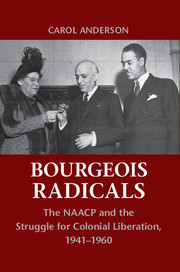'Bourgeois Radicals is a landmark contribution to the literature on African-American anti-colonialism. Carol Anderson’s meticulous research recovers the NAACP’s internationalism and forcefully challenges the orthodox scholarship that has claimed the anti-colonial struggle as a monopoly of the radical left.'
Manfred Berg - Universität Heidelberg
'Modern colonialism was brutal and exploitative enough to draw the fire of activists across a wide political spectrum. In this richly documented and passionately written book, Carol Anderson uncovers the critical work of resourceful NAACP campaigners who used UN mechanisms and the tools of investigative research, publicity, and lobbying, to delegitimize white rule in South Africa, Italian colonialism in Ethiopia, and Dutch colonialism in Southeast Asia. In doing so, she significantly broadens our knowledge of the varieties of black anti-colonial politics in the twentieth century. Bold, engaging and original, this book makes a decisive contribution to histories of black transnational politics, Americans’ participation in multilateral institutions, and the United States’ involvement in the process of global decolonization.'
Paul Kramer - Vanderbilt University, Tennessee
'In Bourgeois Radicals, her much-anticipated successor to Eyes Off the Prize, Carol Anderson offers a lively intervention into the conventional wisdom about the allegedly narrow conservatism of the NAACP’s actions outside American borders. Anderson captures the full scope of the NAACP’s worldview and of its activism, showing that although imperialism and the Cold War hamstrung the organization at times, they did not prevent it from shaping the terms of postwar international debate about race, decolonization, and human rights. This is a finely researched and exquisitely written illumination of the freedom struggle around and beyond the Black Atlantic.'
Jason Parker - Texas A & M University
'In this fine example of revisionist history at its best, Anderson challenges the idea that the NAACP, in the wake of W. E. B. Du Bois’s final departure from that organization in 1948, essentially abandoned its burgeoning commitment to international affairs in the post-WWII era and turned its attention inward. As a consequence, the traditional interpretation goes, the NAACP abandoned Du Bois’s commitment to anticolonial politics. But, as Anderson shows, the archival record tells a different story. In this process of 'de-centering Du Bois', Anderson reveals the myriad ways that the NAACP continued and indeed accelerated its opposition to colonialism and support for liberation movements across the globe, especially in Africa. She is especially effective at revealing the ways that black Americans more generally and the NAACP in particular supported anti-apartheid movements in South Africa … [Anderson] makes a compelling case that the organization hardly turned its attention exclusively to domestic affairs after Du Bois's departure. … Highly recommended.'
D. C. Catsam
Source: Choice
‘… makes invaluable contributions in several ways. Anderson deftly employs manuscript sources from numerous archives in the United States and the UK, including exhaustive research in the NAACP papers, along with an impressive command of diverse scholarly literatures. Her writing is always lucid, frequently elegant …'
Source: Diplomatic History
'Reinvigorates the scholarship on African Americans and the Cold War, removes tarnish associated with the long-time head of the NAACP, Walter White (1931–1955), and makes a powerful case that the focus on Du Bois as the black standard-bearer in the struggle against colonialism is misplaced … combines superb scholarship with a writing style that absolutely crackles with the excitement and tension of a key moment in America’s Cold War diplomacy.'
Michael L. Krenn
Source: The Journal of American History
'Provocatively argued, extensively researched, and passionately written … essential reading for scholars of African and Asian decolonization, black transnational politics, US foreign policy, and the United Nations.'
Robert Trent Vinson
Source: The American Historical Review
'Anderson’s book makes an essential contribution to Black Studies and its relation with the African diaspora and Third World countries. … She provides an essential resource for readers who are familiar with African politics, Cold War history, and are interested in African-American civil rights movements’ international relations.'
Ceren Gürseler Özbilgiç
Source: African Studies Quarterly
'Anderson’s Bourgeois Radicals is the most intensive and meticulously documented study to date of the NAACP’s efforts to uproot European colonialism during and after World War II. She makes excellent use of the Library of Congress’s NAACP Papers, scores of governmental and individual archival collections from across the United States and Great Britain, and a dizzying array of secondary sources. … several of her chapters are models of international history on important regions that deserve to be better known by scholars and students.'
Robert Shaffer
Source: The Journal of African American History



